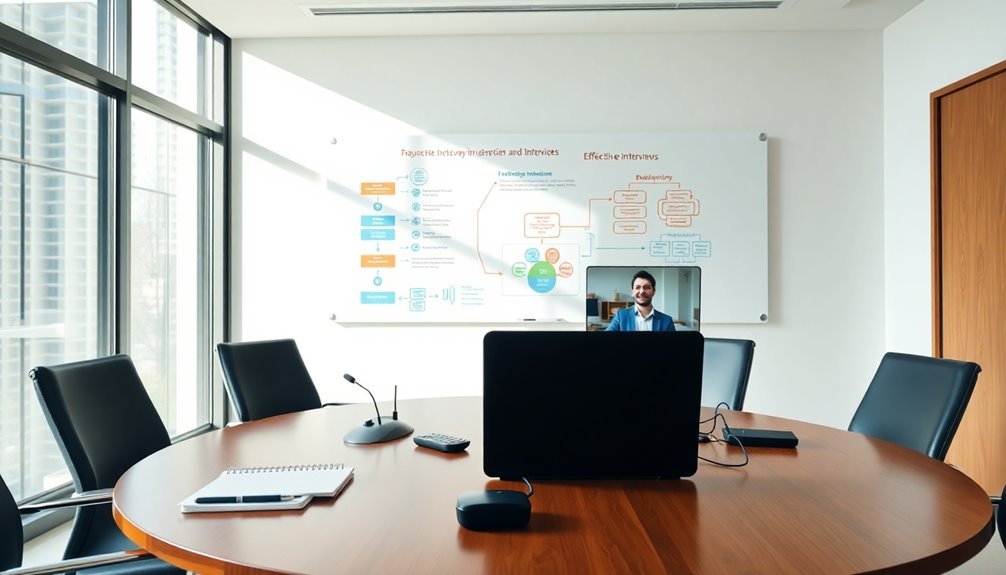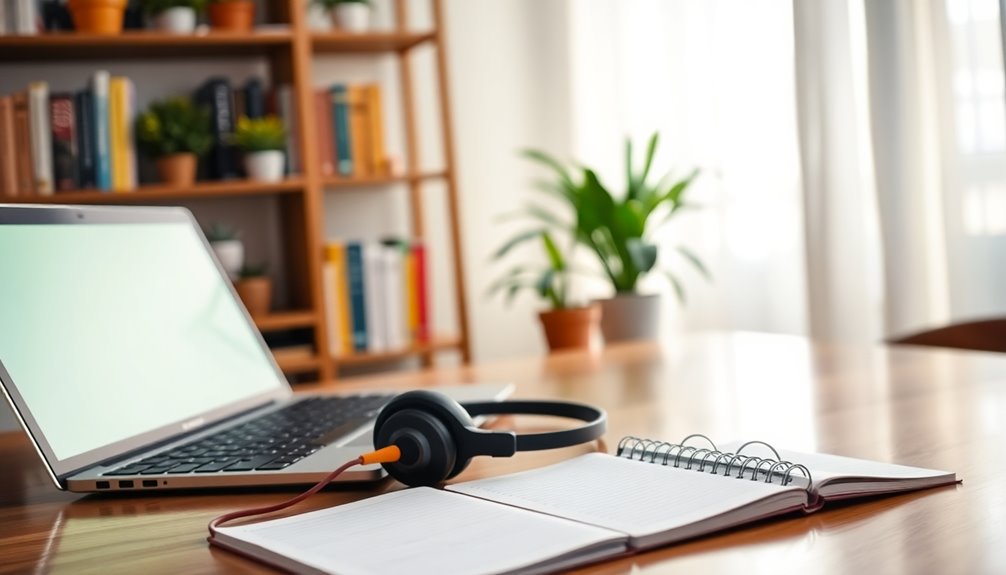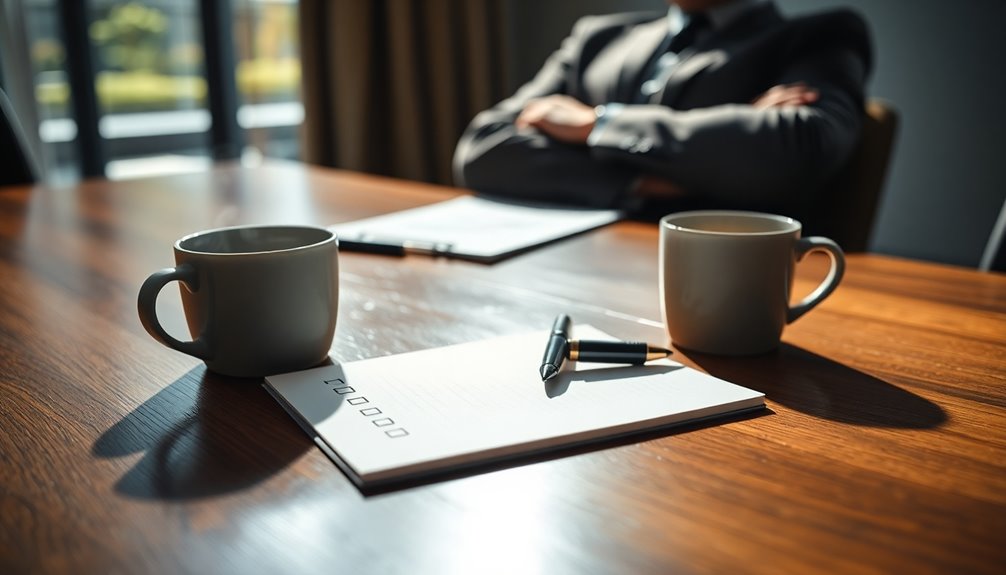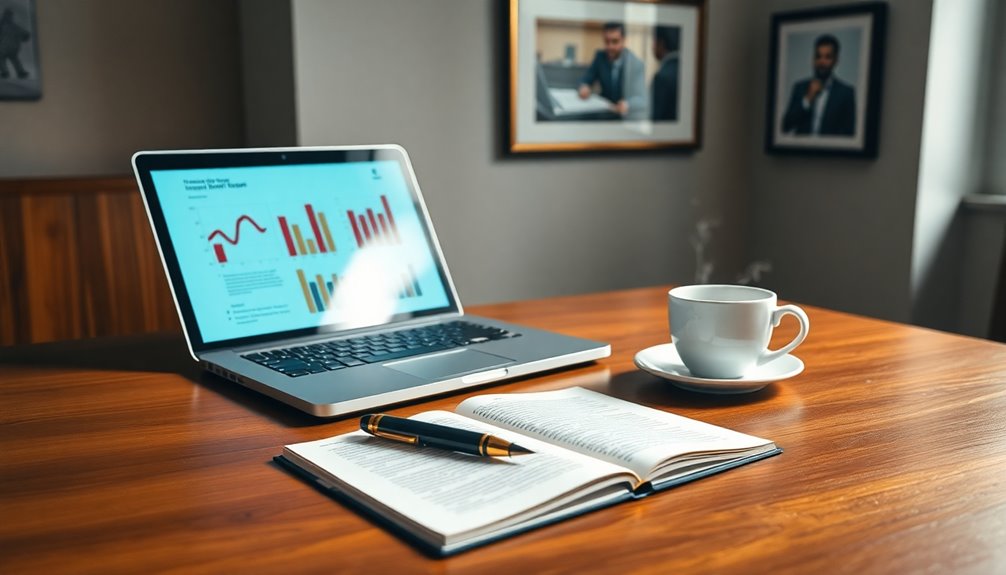Revealing the secrets of interview styles can truly elevate your performance. You'll encounter various formats, from structured to unstructured, and styles like behavioral and stress interviews. Each style aims to assess different skills and behaviors. Understanding these can help you tailor your responses effectively. It's essential to prepare by researching the company and practicing common questions. Don't forget to reflect on how you'll navigate virtual interviews, ensuring your tech is ready and your environment is professional. Mastering these elements boosts your confidence and sets you apart, paving the way for deeper insights into making a lasting impression.
Key Takeaways
- Interview styles vary significantly, including conversational, competency-based, situational, technical, and stress interviews, each serving different assessment purposes.
- Behavioral interviews utilize past experiences to predict future performance, focusing on how candidates handled specific situations.
- Technical interviews assess field-related problem-solving skills, often involving real-time tasks relevant to the job.
- Stress interviews create high-pressure scenarios to evaluate how candidates perform under challenging conditions.
- Understanding the nuances of each style helps candidates prepare effectively and tailor their responses for optimal performance.
Overview of Interview Formats

When preparing for a job search, understanding the various interview formats is essential.
You'll encounter structured interviews, where pre-determined questions assess your skills and experience in a specific order. Unstructured interviews offer flexibility, allowing for open-ended discussions.
Behavioral interviews focus on your past experiences to predict future performance, while panel interviews involve multiple interviewers gauging your fit through rapid questioning.
Group interviews bring several candidates together, emphasizing teamwork and communication. If you're applying for technical roles, expect technical interviews that assess your problem-solving abilities.
Finally, multiple-round interviews provide a deeper evaluation through several individual sessions with different employees.
Knowing these formats helps you tailor your preparation and approach effectively.
Understanding Different Interview Styles

Understanding the various interview styles can considerably impact how you present yourself to potential employers. You might encounter conversational styles that create a relaxed atmosphere, or competency-based styles focused on your skills and qualifications.
Situational interviews challenge you with hypothetical scenarios, while technical interviews test your problem-solving abilities in specific fields. Stress interviews aim to observe how you handle pressure.
Each style requires different approaches; for instance, in a panel interview, you'll need to engage with multiple interviewers simultaneously. By recognizing these styles, you can tailor your responses and behavior, showcasing your adaptability and confidence effectively.
This awareness not only prepares you for different formats but also helps you connect better with interviewers.
Essential Preparation Techniques

A solid preparation strategy can make all the difference in how you perform during an interview. Start by researching the company's mission, values, and culture; it'll help you tailor your responses.
Practice common interview questions to boost your confidence and guarantee you articulate your experiences clearly. Don't forget to prepare thoughtful questions for your interviewers; this shows your genuine interest and engagement.
Dressing appropriately is vital too—professional attire aligns with company expectations and creates a positive first impression.
Finally, review your resume and achievements to discuss them effectively. By following these essential techniques, you'll position yourself as a strong candidate and enhance your chances of landing the job.
Navigating Virtual Interviews

Virtual interviews have become a staple in the hiring process, making it essential to navigate them effectively. Start by ensuring your technology works smoothly; check your internet connection and equipment beforehand. Choose a quiet, well-lit space to present yourself professionally. Your body language matters too—maintain eye contact and sit up straight to convey confidence.
Here's a quick reference table to keep in mind:
| Consideration | Tips |
|---|---|
| Technology Check | Test video and audio equipment in advance. |
| Environment Setup | Select a distraction-free, well-lit area. |
| Dress Code | Wear professional attire to make a good impression. |
Effective Post-Interview Practices

After an interview, your actions can greatly impact your chances of landing the job. Start by sending a follow-up email to thank your interviewers for their time and to express your continued interest in the position. This simple gesture helps you stand out and reinforces your enthusiasm.
Next, take a moment to reflect on your performance. Identify what went well and what you could improve for future interviews. It's also a great idea to connect with your interviewers on LinkedIn; this can help build a professional relationship.
Stay informed about the company by keeping up with their news, showing your ongoing commitment. Finally, prepare for potential next steps, whether it's a second interview or additional assessments.
Common Interview Questions

Once you've wrapped up your interview and reflected on your performance, it's time to think about the kinds of questions you might face in future interviews. Familiarizing yourself with common interview questions can enhance your confidence and readiness.
Here are four typical questions to prepare for:
- Tell me about yourself. – This is your chance to summarize your experience and showcase your skills.
- What are your strengths and weaknesses? – Be honest but strategic; focus on traits relevant to the job.
- Why do you want to work here? – Show your knowledge of the company and its culture.
- Describe a challenge you've faced and how you overcame it. – Use this to highlight problem-solving skills and resilience.
Tips for Success in Interviews

Success in interviews often hinges on preparation and self-awareness. Start by thoroughly researching the company, understanding its mission and culture. This knowledge helps you tailor your responses effectively.
Practice common interview questions to build confidence and refine your delivery. Don't forget to prepare insightful questions for interviewers; this shows your genuine interest in the role.
Dress appropriately, as first impressions matter. Whether in-person or virtual, maintain professionalism. For virtual interviews, make certain your technology is reliable and your environment is distraction-free.
Be mindful of your body language; maintain eye contact and a positive demeanor. Additionally, channeling your high vibrational energy can enhance your confidence and presence during the interview. Finally, follow up with a thank-you email, reiterating your enthusiasm for the position, and reflect on your performance to identify areas for improvement.
Frequently Asked Questions
What Should I Do if I Feel Nervous During an Interview?
If you feel nervous during an interview, take a deep breath and remind yourself that it's normal.
Practice grounding techniques, like focusing on your breathing or visualizing a positive outcome. Prepare thoroughly so you feel confident in your answers.
You can also turn nervous energy into enthusiasm by engaging with your interviewers.
How Can I Effectively Follow up After an Interview?
After an interview, it's essential to follow up effectively.
Send a thank-you email within 24 hours, expressing gratitude for their time and reiterating your interest in the position. Personalize your message by mentioning specific topics discussed during the interview. This shows you were engaged and attentive.
Additionally, stay connected on professional platforms like LinkedIn to maintain a relationship and keep yourself on their radar for future opportunities.
What Are Some Red Flags to Watch for in Interviews?
In interviews, spotting red flags can feel like finding a needle in a haystack!
Watch for disorganized interviewers who seem unprepared or distracted, as it reflects poorly on the company. Pay attention to vague answers about company culture or values—this might indicate a lack of transparency.
If the interviewer seems uninterested or disengaged, that's a major warning sign. Trust your instincts; a good fit should feel mutually exciting and engaging.
How Important Is Body Language During an Interview?
Body language is essential during an interview. It communicates your confidence, engagement, and interest without saying a word.
Maintain eye contact to show attentiveness, and use open gestures to convey approachability. Nodding occasionally can indicate agreement and understanding.
Be mindful of your posture; sitting up straight demonstrates professionalism. Avoid crossing your arms, as it may seem defensive.
What Should I Research About the Interviewers Before the Meeting?
Before your interview, research the interviewers by checking their professional backgrounds on platforms like LinkedIn.
Look into their roles, experiences, and any shared connections. Understanding their expertise and interests can help you tailor your responses and engage in meaningful conversation.
You can also identify potential common ground, which can make you more relatable. This preparation shows your genuine interest and can help you build rapport during the meeting.
Conclusion
In summary, mastering the myriad of interview methods is essential for crafting compelling connections with employers. By being bold, building your brand, and balancing preparation with authenticity, you can confidently conquer any interview scenario. Remember, each style offers unique opportunities to showcase your skills and shine. So, stay sharp, stay sincere, and seize the chance to stand out in your professional pursuits. With these strategies, you're well on your way to interview success!
Eugene brings a fresh, dynamic voice to our platform as one of our talented Writers. Specializing in research-driven content, he explores the latest findings in psychology and personal growth, translating them into actionable insights for our readers. Eugene’s work is fueled by a curiosity about what makes us tick and a desire to help others unlock their potential.










